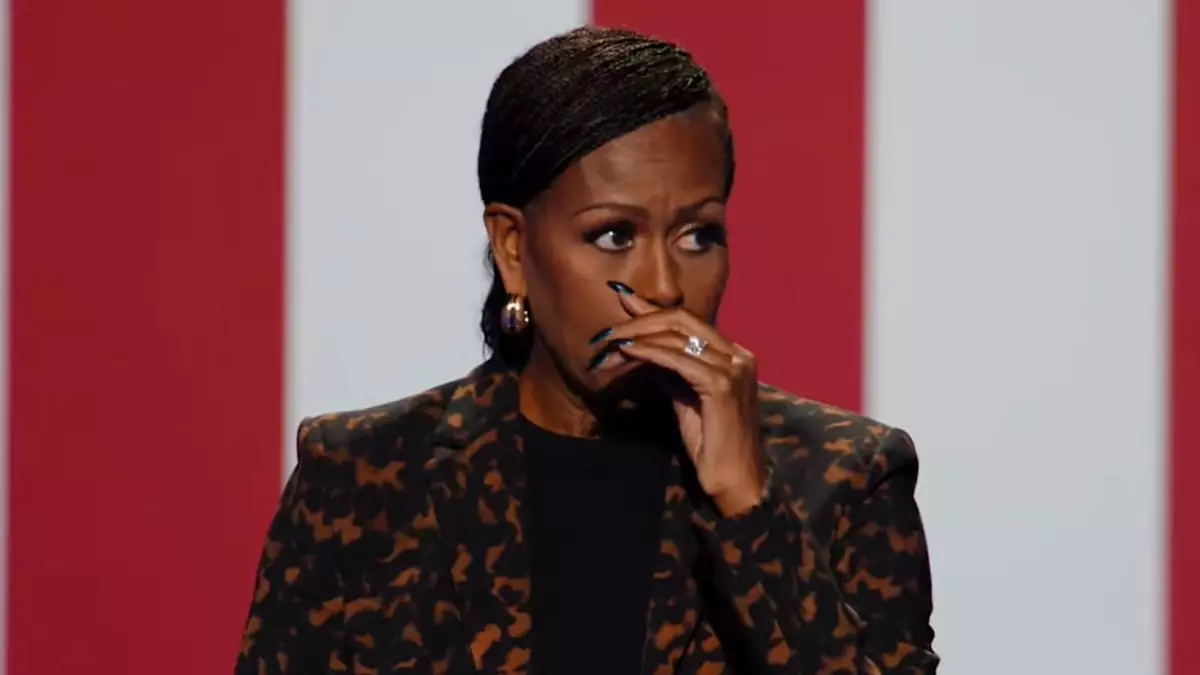On October 26, 2024, Michelle Obama captivated a Michigan audience by lending her voice and experience to the campaign of presidential candidate Kamala Harris. Dressed in a striking tortoiseshell pantsuit from Theory, Michelle’s entrance was met with enthusiastic applause, yet it was the heartfelt nature of her message that resonated most profoundly. Obama deftly intertwined her personal narrative with a critical commentary on the state of women’s health in the U.S., emphasizing the necessity for societal and legislative acknowledgment of women’s healthcare issues.
At the heart of her address was a poignant exploration of the often-ignored struggles associated with menopause and reproductive health. Michelle articulated the harrowing reality that many women face, describing menopause’s “debilitating” effects, which include hot flashes, depression, and a host of physical discomforts that too frequently go unacknowledged. The underlying theme of shame and silence surrounding these experiences was especially striking. “We’ve been taught shame and how to hide how our bodies work,” Obama stated, highlighting a cultural stigma that continues to leave many women isolated in their struggles.
Michelle Obama’s remarks transcended her personal experiences and tapped into a wider societal issue: the necessity of recognizing women as multifaceted individuals with complex health needs. They are not merely “baby-making vessels,” she emphasized, but rather a diverse group grappling with life-threatening conditions and frequent misdiagnoses. By shedding light on the abnormal Pap smears, unexpected lumps, and the lurking possibility of cervical cancer, she empowered her audience—men and women alike—to understand that these health matters require urgent attention and informed dialogue.
“The floor falls out from under us,” Michelle articulated, bringing to life the deep fears women face when confronting potential health crises. Her message was directed not only toward women but also to men, inviting them to empathize with the vulnerability experienced by their partners, mothers, and daughters. By doing so, she dismantled the notion that women’s health is solely a “women’s issue,” positioning it as a matter of public concern that affects families and communities broadly.
What made Michelle’s address even more impactful were her insights into the intersection of race and healthcare. She candidly remarked how women of color often face greater healthcare disparities, revealing a troubling truth supported by studies: bias and neglect in the healthcare system can lead to dire consequences for marginalized groups. “If you happen to look like me, you are more likely to be ignored,” she said, drawing attention to a critical societal failure.
The conversation about healthcare inequities is incredibly timely, as the ongoing pandemic has further illuminated existing disparities. Michelle’s assertion that women’s experiences are frequently overlooked by science echoes a larger sentiment that systematic change is indispensable. There is a pressing need for not only more research but also for representation in medical decision-making processes to ensure that diverse voices are heard and accounted for.
As she drove her point home, Michelle Obama issued a compelling call to action, urging her audience to consider the political implications of their healthcare policies. “Take our lives seriously,” she implored, emphasizing the reproductive rights and health risks women face when their choices are legislated by those who lack firsthand understanding of these experiences.
Her emotional appeal transcended party lines, aiming to consolidate support around a shared understanding of women’s health needs. By articulating the potential consequences of healthcare policies, she painted a vivid picture of how legislation impacts individuals’ lives. From the fear of undiagnosed cervical cancer to the anxiety surrounding pregnancy complications, she compelled everyone present to recognize the urgency of the situation.
Michelle Obama’s address was more than a political endorsement; it was an impassioned plea for greater awareness and more compassionate policies regarding women’s health. The resonance of her words reflects an ongoing fight for recognition and rights that extends beyond the ballot box. As she underscored the importance of supporting leaders who prioritize comprehensive healthcare, Michelle’s message should serve as an enduring reminder of the collective responsibility to foster a society where women’s health is treated with the seriousness it rightly deserves.
In a world where discussions about health and wellness often ebb and flow with trending topics, Michelle’s candidness has the potential to incite lasting change. Women can no longer remain silent—this continued advocacy for awareness, understanding, and action marks a significant stride toward a more equitable healthcare future for all.

